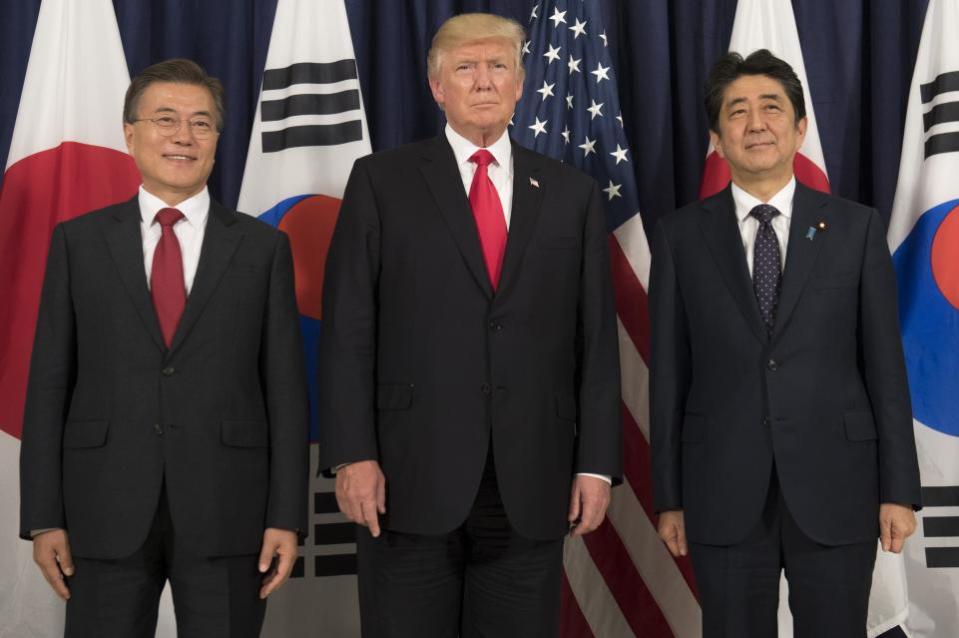South Korea's President Wants Peace With North Korea
South Korea’s offer to hold talks with North Korea is still on the table, even after Pyongyang conducted its sixth and largest nuclear test to date.
“South Korea’s proposal for dialogue still remains effective as it was for talks on easing military tensions and urgent humanitarian issues, not on North Korea’s nukes,” said an official at Seoul’s Unification Ministry, as quoted in local media.
Dialogue with North Korea was one of President Moon Jae-in’s key campaign promises. The son of North Korean immigrants who fled to the South during the Korean War, Moon is a former human rights lawyer who vowed, in his inauguration speech in May, to build peace on the Korean Peninsula.
Considered to be on the left of the Korean political spectrum, Moon and his party’s “Sunshine Policy”-inspired attitude toward North Korea was bound to spell trouble for his relationship with Donald Trump. Despite once saying he’d be “honored” to meet North Korean ruler Kim Jong Un, Trump has recently rebuked Moon’s pro-dialogue policy, calling it “talk of appeasement” with North Korea.
Moon’s policy also stands in stark contrast with that of Japan, the U.S.’s other key ally against North Korea. Prime Minister Shinzo Abe and his conservative party have been all too eager to review Japan’s pacifist constitution to expand the role of the military, which is currently confined to self-defense.

“President Moon came into office with a proactive engagement policy toward North Korea and a goal to finally achieve the Sunshine Policy of his progressive predecessors, unlike Washington and Tokyo,” Duyeon Kim, visiting senior fellow at the Seoul-based think tank Korea Peninsula Future Forum, tells Newsweek.
“That has not changed. But he has taken on a more pragmatic approach to show Washington and the world that the allies are on the same page and to show that he understands the reality of the North Korean threat today, which is very different from when he was last in government,” Kim says.
While Moon continues to keep the options of talks on the table, he has not given up on increasing South Korea’s self-defense capacities. Moon is unlikely to cave in to the opposition party’s pressure to allow South Korea to develop its own nuclear weapons, but the country’s Ministry of Defense said Monday the country is seeking to deploy four additional Terminal High Altitude Area Defense missile systems.
Seoul’s military also carried out live-fire drills targeting the North on Monday and Tuesday. South Korea and the U.S. are planning additional military exercises for Thursday and Friday.
“Moon’s stance has recently become even tougher because of consecutive North Korean provocations and his ‘deep disappointment’ after Pyongyang’s sixth nuclear test,” Kim says. “Moon has repeatedly sent olive branches, proposals for dialogue and made overtures, but Pyongyang has rejected them and continued to threaten South Korea, the region and the U.S. with nuclear and missile tests. Still, President Moon’s door to dialogue remains open, and we can expect Seoul would be eager to grab an opportunity for dialogue with Pyongyang.”
The South Korean president spoke to Trump on Friday and later on Monday. On both occasions, the leaders stated their intention to allow South Korea to develop bigger warheads. Trump also gave his “conceptual approval” to Seoul’s purchase of “billions of dollars” of military equipment, the U.S. president said on Twitter Tuesday.
In readouts of the calls, however, Seoul and Washington differed on a crucial point: dialogue with the North. In the White House statement, there was no mention of what South Korea described as the two leaders “reaffirming their view that it was important to have North Korea come out to the dialogue table to peacefully resolve the North Korean nuclear issue by applying maximum sanctions and pressure on the North.”
Media reports suggesting that Trump is considering withdrawing from the United States-Korea Free Trade Agreement with South Korea have also contributed to the souring of relationships at a most inopportune time. “This is not the time for President Trump to be withdrawing from the FTA, picking fights with and isolating its closest ally, South Korea. That’s exactly what Pyongyang wants. Washington needs to coordinate closely with Seoul,” Kim says.
Seeking to put any controversy to rest, South Korea’s prime minister said there was no misunderstanding or disagreement between Moon and Trump. “Their cooperation is not a rhetorical one but action-backed substantial cooperation,” Prime Minister Lee Nak-yon said Tuesday, as quoted in local media.
Related Articles


